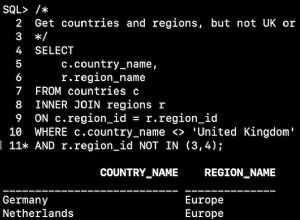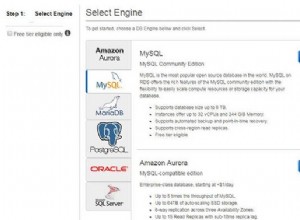Vous pourriez, comme vous l'avez dit, avoir une table qui stocke tous les nombres premiers jusqu'à 10 millions . Il serait alors trivial de rechercher si un nombre est premier ou non. La question est alors de savoir quelle méthode serait la plus rapide. Je soupçonne que la table serait beaucoup plus rapide (je n'ai pas testé cette affirmation).
Solution de table principale
-
https:// www.simple-talk.com/sql/t-sql-programming/celkos-summer-sql-stumpers-prime-numbers/
Fournit quelques solutions et il y en a d'autres dans les commentaires. -
https:// sqlserverfast.com/blog/hugo/2006/09/the-prime-number-challenge-great-waste-of-time/
Pareil ici. Quelques solutions proposées.
Solutions de fonctions SQL
Solution 0Voici une solution via Trouver des nombres premiers avec une fonction Transact-SQL :
SET ANSI_NULLS ON
GO
SET QUOTED_IDENTIFIER ON
GO
–- =============================================
–- Author: Nicolas Verhaeghe
–- Create date: 12/14/2008
–- Description: Determines if a given integer is a prime
/*
SELECT dbo.IsPrime(1)
SELECT dbo.IsPrime(9)
SELECT dbo.IsPrime(7867)
*/
–- =============================================
CREATE FUNCTION [dbo].[isPrime]
(
@NumberToTest int
)
RETURNS bit
AS
BEGIN
-– Declare the return variable here
DECLARE @IsPrime bit,
@Divider int
–- To speed things up, we will only attempt dividing by odd numbers
–- We first take care of all evens, except 2
IF (@NumberToTest % 2 = 0 AND @NumberToTest > 2)
SET @IsPrime = 0
ELSE
SET @IsPrime = 1 –- By default, declare the number a prime
–- We then use a loop to attempt to disprove the number is a prime
SET @Divider = 3 -– Start with the first odd superior to 1
–- We loop up through the odds until the square root of the number to test
–- or until we disprove the number is a prime
WHILE (@Divider <= floor(sqrt(@NumberToTest))) AND (@IsPrime = 1)
BEGIN
–- Simply use a modulo
IF @NumberToTest % @Divider = 0
SET @IsPrime = 0
–- We only consider odds, therefore the step is 2
SET @Divider = @Divider + 2
END
–- Return the result of the function
RETURN @IsPrime
END
Voici une autre solution via comment savoir si est premier ou non premier avec une instruction select ? Il y a aussi plus d'informations dans d'autres commentaires.
CREATE FUNCTION isPrime
(
@number INT
)
RETURNS VARCHAR(10)
BEGIN
DECLARE @prime_or_notPrime INT
DECLARE @counter INT
DECLARE @retVal VARCHAR(10)
SET @retVal = 'FALSE'
SET @prime_or_notPrime = 1
SET @counter = 2
WHILE (@counter <= @number/2 )
BEGIN
IF (( @number % @counter) = 0 )
BEGIN
set @prime_or_notPrime = 0
BREAK
END
IF (@prime_or_notPrime = 1 )
BEGIN
SET @retVal = 'TRUE'
END
SET @counter = @counter + 1
END
return @retVal
END




